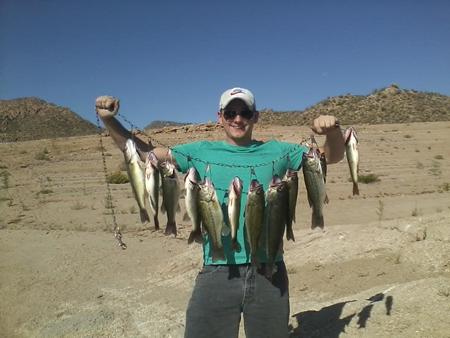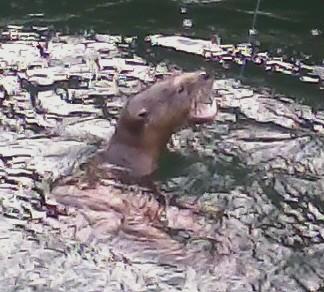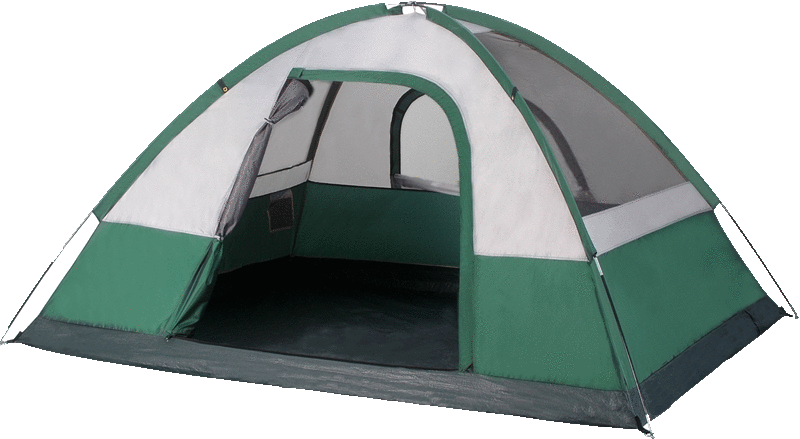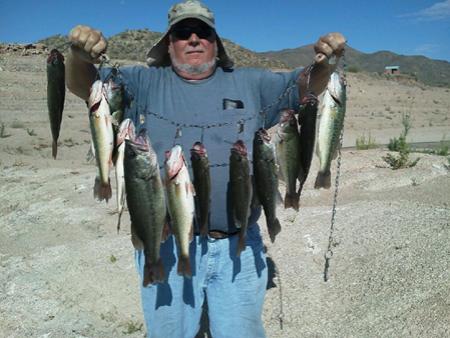In no other year have there been as many trips to Bartlett
Lake for us. Main reason – the fish were biting in 2012! David and his
cousin went first. Later I jumped on some invitations. Another reason
was our dry and hot weather. Resulting fire restrictions kept us from
going shooting.
Don’t get me wrong. At Bartlett it’s still fishing and not always
catching. Coming home without a limit of largemouth bass was the
exception, however.
Bass have been the most-cooperative species there. Amongst us, David
caught the only crappie so far this year. And I had a memorable few
seconds once when something big nailed my idling lure and tore line
off my reel with the drag clutch singing. It was indeed a hopeful
fight until the contender at the end of the line revealed itself as
a carp. Can’t even tell you how big he was because he got off when
I tried to lift the thing into the boat.
Occasionally a really optimistic bluegill hooks itself on our lures.
They are voracious feeders, attacking what is clearly out of proportion
size-wise.
There was at least one day where a limit of bass decorated our
stringers early. So we targeted Bluegills with smaller trout lures,
and kept a few worthy of filleting.
Speaking of early, all our trips have a couple of constants. The main
feature is David’s 14 foot flat bottom boat. It is older than his
sons, and way more trustworthy (sorry boys). Didn’t matter who went
to the lake. That boat was the way to get to the fish.
The other constant was timing. We got out of bed unwillingly early
to be on the water at no later than 4AM. Often the action noticeably
declined once the sun crawled over the Mazatzal mountains.

Michael with a stringer
|
Those are two elements to catching Bartlett bass – get there early,
bring a good boat. No, I’m not going to give you all the secrets.
Exploring is part of the fun.
Can’t see what it’ll hurt to mention lures. Many worked. David’s
favorite is a slurping topwater plug. People say topwater is the
most fun way to catch a bass. Tough to argue that.
Me, I haven’t learned yet to operate one of those efficiently. My
happiness came from below, sending various deep-running plugs. One
with a hinged back design seemed especially fruitful.
We usually cast towards the bank. Often while retrieving my diver,
I’d glance at David’s topwater plug acting like some seriously hurt
critter struggling on the surface. Then came the sudden splash, and
‘fish on!’. He typically catches the most. But not always. To
date he did catch the biggest bass in 2012, a 3+ pounder.
Aside from tasty bass fillets later, all the uncertainty, makes
each trip worthwhile. Besides, those early hours on the water are
one of nature’s many pleasures. Critters come to drink. Herons
stalk near the bank. Vultures sail overhead, hopeful. If you’re
lucky, you’ll even see agile competition – otters! Don’t cast
around them or you really have a fight going. You have to be there
early to take those experiences in.

The competition
|
Add the occasional tug on your line, and out come the smiles.
Depending on how badly you want to take home fresh fish, moments
of stress arise when something struggles at the end of the line
and it’s not in the boat yet. What kind is it? How big is it?
Oh no, he’s jumping – a movement where they come off the easiest.
Then the approach to the boat … play the bass so the final extra
pull with the rod will lift the wet beast out of its element and
into the 14 footer. Despite losing fish at that last phase of
the fight we do not use nets. It takes too much extra time to
untangle the lure. OK, OK, some fish were big enough such that
‘wish I’d used a net’ slipped past our lips. Oh well, our choice.
As I’m writing this the bite is still ‘on’. Next trip is already
planned, and only severe monsoon activity would rain on our parade.
In my mind I see the faint early morning outline of the bank and
mountains behind it. Mostly my wrist swings the fishing rod.
With a gentle hiss and whining line the lure is on its way into
the dark. If I guessed the distance to land correctly it’ll splash
into the water somewhere out there. Otherwise an uneasy clank will
indicate that plastic hit something solid on the bank. Either way,
I begin to crank the handle, feel the resistance of the lure diving
deep. Meanwhile I hear David’s topwater lure splashing spastically.
Who will get the first, the next largemouth?

![]()





